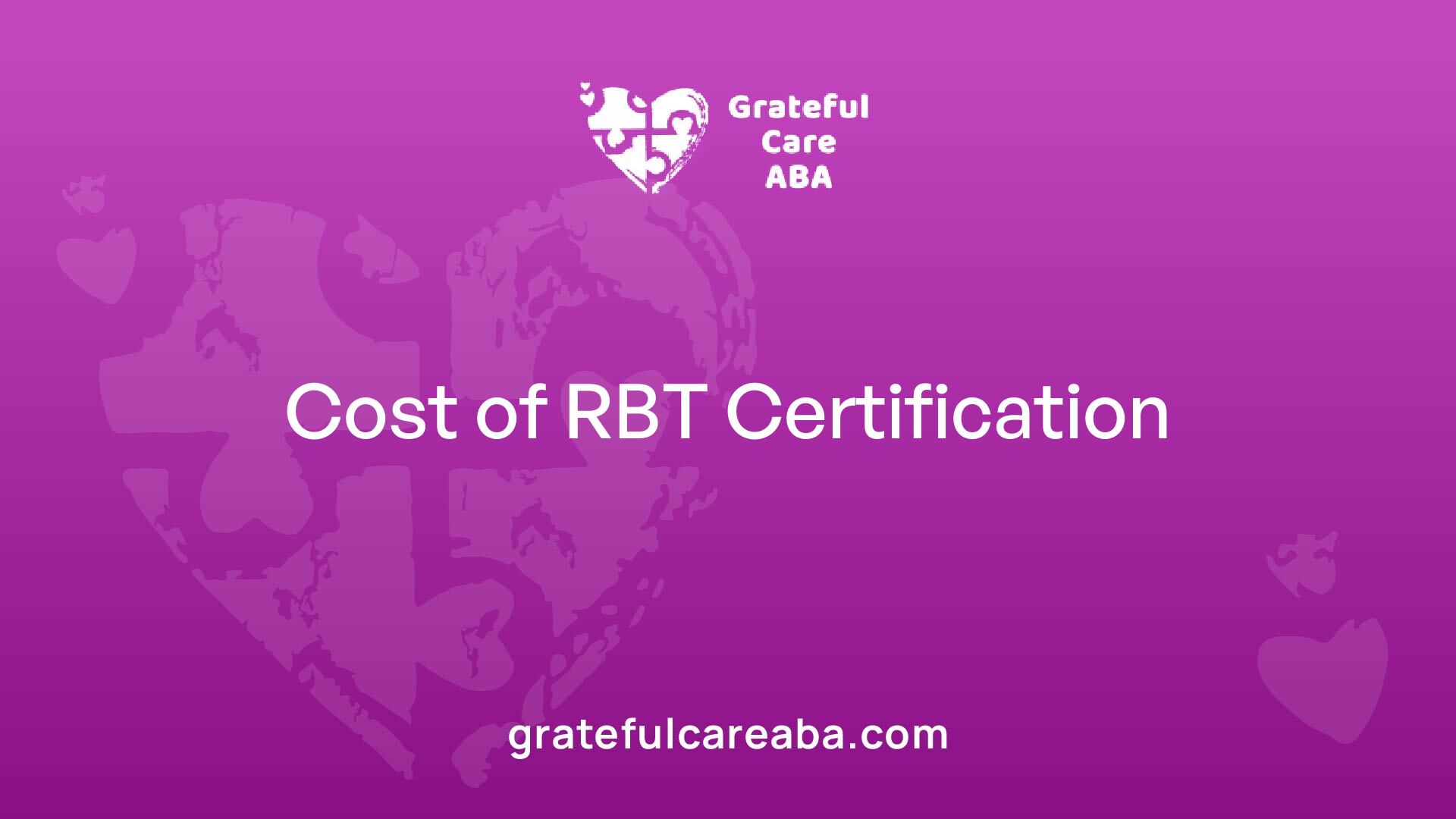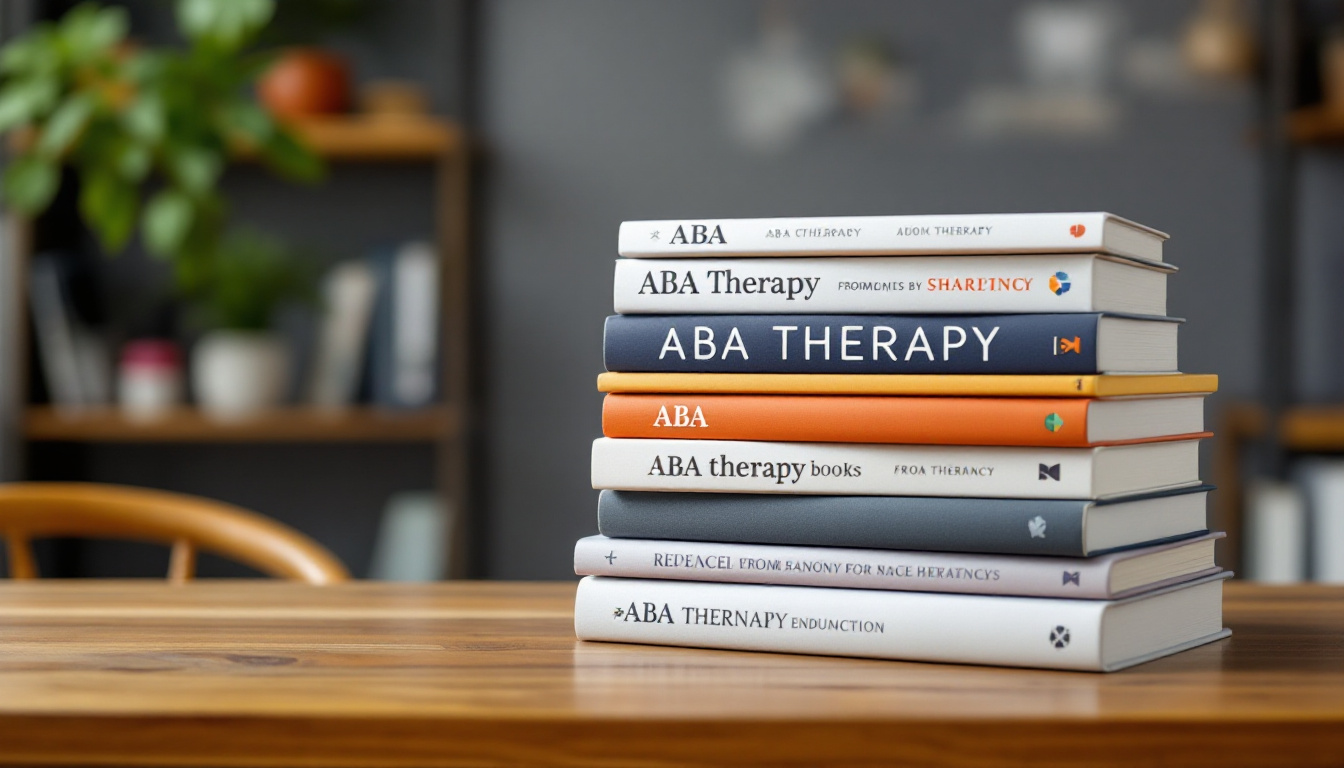Cost of RBT Certification
Unveil the true cost of RBT certification with insights on fees, renewals, and financial assistance options. Master your budgeting today!

Nicole S.
.jpg)
Understanding RBT Certification Costs
When considering the cost of RBT certification, it's essential to have a clear understanding of the expenses involved in the training and certification process. This section provides an overview of RBT training costs and highlights the key factors that influence the overall expenses.

Overview of RBT Training Costs
The cost of a 40-hour training course for RBT certification typically ranges between $100 to $400, encompassing essential training materials and resources [1]. The training program is a crucial step in preparing individuals to become competent Registered Behavior Technicians and meet the requirements set by the Behavior Analyst Certification Board (BACB).
RBT training programs can vary in cost, ranging from $200 to $1,000 depending on the providers, location, and format of the training (in-person or online). Additional expenses may be incurred for study materials and practice exams, depending on the specific program selected. It's important for aspiring RBTs to budget for these training costs to ensure a smooth certification process.
Factors Influencing Training Program Costs
Several factors can influence the costs associated with RBT training programs. Providers offering training may have different pricing structures based on the quality and comprehensiveness of their courses. In-person training sessions might have higher associated costs compared to online training formats, taking into account factors like travel expenses and venue rental.
Moreover, the inclusion of additional resources such as supervision, access to study materials, and practice exams can impact the overall training costs. Aspiring RBTs should carefully evaluate the offerings of different training programs to choose one that aligns with their budget and learning preferences.
Understanding the breakdown of RBT training costs is crucial for individuals planning to pursue certification in applied behavior analysis. By considering the various factors that influence the costs and comparing different training options, aspiring RBTs can make informed decisions regarding their certification journey. Budgeting effectively for RBT training not only ensures a smooth path to certification but also sets the foundation for a successful career as a Registered Behavior Technician.
RBT Certification Application Fees
When considering the cost of RBT certification, it's essential to understand the breakdown of application fees and examination expenses associated with the certification process. These fees are pivotal in the journey to becoming a Registered Behavior Technician.
Application Fee Breakdown
To kickstart the RBT certification process, candidates are required to pay an application fee for registration with the Behavior Analyst Certification Board (BACB). The application fee typically ranges from approximately $50 as cited by ABTABA. This fee covers the administrative costs involved in processing your application and verifying your eligibility for the RBT certification.
Examination Fee Details
In addition to the application fee, aspiring Registered Behavior Technicians must also cover examination fees to sit for the RBT certification exam. The examination fee varies but generally falls within the range of $50 to $100, as mentioned by ABTABA. This fee is payable to the Behavior Analyst Certification Board (BACB) and covers the cost of exam administration, along with processing the certification applications.
It's advisable to verify the current examination fee guidelines on the BACB website, as exam fees are subject to change periodically. Candidates should budget for this expense as part of their overall investment in pursuing RBT certification.
Understanding the details of application fees and examination costs is crucial for individuals embarking on the path to becoming a Registered Behavior Technician. By planning and allocating resources for these expenses, candidates can smoothly navigate the certification process and take a significant step towards advancing their careers in behavior analysis.
Renewal Costs for RBT Certification
When it comes to maintaining RBT certification, individuals need to consider both the annual renewal fee and the expenses related to acquiring Continuing Education Units (CEUs) periodically. Let's delve into the specifics of these renewal costs:
Annual Renewal Fee
The typical annual fee for renewing RBT certification ranges approximately around $45 per year. However, the exact amount may vary slightly based on the certifying organization and its specific renewal policies. It's essential for RBTs to budget for this renewal fee to ensure the uninterrupted validity of their certification.
Continuing Education Unit Expenses
In addition to the annual renewal fee, RBTs are required to fulfill 20 Continuing Education Units (CEUs) every two years to stay current in their field and maintain their certification status. The cost per credit hour for these CEUs can range between $10 to $50, depending on the training provider and the nature of the educational program chosen.
It's crucial for RBTs to allocate funds for both the annual renewal fee and the CEU expenses to meet the ongoing requirements for maintaining their certification. Planning ahead for these costs ensures that RBTs comply with the necessary continuing education standards and keep their certification up to date.
For detailed information on other aspects of RBT certification costs, such as training program expenses and application fees, refer to our guide on the cost breakdown for RBT certification. If you're interested in exploring financial assistance options to help offset these costs, check out our section on scholarships and grants and employer support programs. By understanding the various elements of RBT certification costs, individuals can make informed decisions regarding their certification renewal and budgeting strategies.
Financial Assistance Options
Aspiring Registered Behavior Technicians (RBTs) often seek financial assistance options to help alleviate the cost burden of obtaining RBT certification. Scholarships, grants, and employer support programs are among the avenues available to individuals looking to pursue a career in applied behavior analysis.
Scholarships and Grants
Organizations, foundations, and associations within the field of applied behavior analysis provide scholarships and grants to support individuals committed to obtaining certifications like RBT. These financial aid options aim to lessen the financial strain associated with certification costs, making it more feasible for individuals to pursue their career goals. Exploring scholarship and grant opportunities can help offset the expenses of RBT training, examination fees, and supervision, ultimately making RBT certification more accessible.
Employer Support Programs
Employer sponsorship and reimbursement programs play a crucial role in assisting individuals pursuing RBT certification. Many employers in the field of applied behavior analysis offer support programs that cover or reimburse certification costs for their employees. By leveraging employer support programs, aspiring RBTs can receive financial assistance to cover training expenses and exam fees, reducing the overall financial burden associated with certification.
Exploring these financial assistance avenues can significantly contribute to making RBT certification more affordable and attainable for individuals seeking to establish a career in applied behavior analysis. By utilizing scholarships, grants, and employer support programs, aspiring RBTs can offset the costs associated with certification, paving the way for a rewarding and fulfilling career in behavior therapy.
Comparison of RBT Certification Costs
Exploring the cost implications of becoming a Registered Behavior Technician (RBT) involves understanding the financial commitments associated with the certification process. This section delves into the variations in costs across providers and strategies for identifying cost-effective options to facilitate informed decision-making.
Cost Variations Across Providers
The cost of acquiring RBT certification typically falls within the range of $100 to $400, encompassing expenses related to training programs, examination and application fees, and supplementary study materials [2]. However, it is essential to note that the exact costs may vary depending on the training provider, the format of the program (in-person or online), and any additional resources or materials included in the training package [3].
Factors influencing the overall cost of RBT certification encompass the fee structure of the training program, examination fees, and supplementary expenses like study aids and practice exams. Each provider may offer distinct pricing models based on the scope and quality of their training programs, leading to cost discrepancies across different certification pathways. Prospective RBTs are advised to conduct thorough research on available training options to identify the most suitable and cost-effective route.
Identifying Cost-Effective Options
To mitigate the financial burden associated with pursuing RBT certification, individuals are encouraged to explore financial assistance options available in the form of scholarships, grants, employer support programs, and reimbursement initiatives. These resources aim to alleviate the financial strain of certification expenses and make the process more accessible to aspiring RBTs.
When evaluating the cost-effectiveness of RBT certification pathways, applicants should consider not only the upfront expenses but also the long-term benefits and career opportunities that certification can unlock. By comparing the costs, benefits, and support mechanisms offered by different providers, individuals can make informed decisions that align with their financial circumstances and professional objectives.
Navigating the realm of RBT certification costs requires a strategic approach to balancing financial considerations with career aspirations. By understanding the cost landscape across providers and leveraging available resources for financial assistance, individuals can embark on their RBT journey with confidence and financial stability.
Cost Breakdown for RBT Certification
When considering the cost of RBT certification, it's essential to break down the expenses involved to understand the financial commitment required for this professional qualification. The main components of the cost breakdown for RBT certification include training program expenses and application and exam fees.
Training Program Expenses
RBT training programs are a vital requirement for individuals seeking certification. These programs typically consist of a specified number of training hours, often ranging from 40 to 60 hours. The cost of RBT training programs can vary depending on several factors, including the training provider, format of the program (in-person or online), and any additional resources or materials included.
The cost of RBT training programs typically ranges between $100 to $500, covering online or in-person training sessions, supervision, and access to learning materials [2]. Investing in a comprehensive and accredited training program is crucial for gaining the necessary knowledge and skills to excel as a Registered Behavior Technician.
Application and Exam Fees
In addition to training expenses, candidates pursuing RBT certification need to account for application and exam fees. The cost of obtaining RBT certification typically ranges between $100 to $400, covering fees for training programs, examination, and application fees, as well as any additional study materials required.
The breakdown of application and exam fees for RBT certification typically includes a $50 application fee for the Behavior Analyst Certification Board (BACB) and an examination fee of around $45. Candidates may also incur additional costs, such as background check fees costing approximately $50 when applying for RBT certification.
Understanding the cost breakdown for RBT certification is crucial for individuals planning to embark on this career path. By budgeting for training program expenses, application and exam fees, and other associated costs, aspiring Registered Behavior Technicians can effectively plan their financial resources to pursue this valuable certification.
Budgeting for RBT Certification
When considering the cost of RBT certification, it is essential to create a comprehensive budget to cover the expenses associated with the certification process. By planning ahead and exploring payment plans and assistance programs, individuals can pursue their RBT certification with financial confidence.
Creating a Certification Budget
To begin crafting a certification budget, individuals should first assess the various costs involved in obtaining RBT certification. The cost breakdown typically includes expenses related to training programs, application fees, examination fees, and potentially renewal fees. Understanding these costs upfront can help in mapping out a realistic budget and avoiding any financial surprises along the way.
One significant cost factor to consider is the training program expenses. The cost of a 40-hour training course for RBT certification can range between $100 to $400, encompassing training materials and essential resources [1]. Additionally, the overall cost of RBT training programs may vary from $200 to $1,000, depending on the provider, location, and format (in-person or online). It is vital to budget for potential additional expenses such as study materials and practice exams.
Payment Plans and Assistance Programs
For individuals seeking financial support to pursue RBT certification, various payment plans and assistance programs can help alleviate the financial burden. Financial assistance options, including scholarships, grants, and employer support programs, are available to assist candidates in covering the costs associated with certification.
By exploring these avenues, aspiring RBTs can identify opportunities for financial aid and tailor their certification budget accordingly. Payment plans offered by training programs and professional organizations can also provide candidates with flexibility in managing their certification expenses.
Understanding the costs involved and proactively planning a certification budget can empower individuals to embark on their RBT certification journey with financial preparedness. By leveraging payment plans and seeking assistance from available programs, aspiring RBTs can pursue their certification goals with confidence and financial stability.
Maximizing Value of RBT Certification
Upon achieving RBT certification, individuals open doors to numerous benefits that can enhance their career trajectory and financial growth. The certification brings forth both tangible and intangible advantages, focusing primarily on career advancement benefits and return on investment benefits.
Career Advancement Benefits
Earning the Registered Behavior Technician (RBT) certification can significantly boost one's professional development. Possessing this recognized certification demonstrates a commitment to excellence in the field of applied behavior analysis and showcases competence in implementing behavior intervention programs under the supervision of a Board Certified Behavior Analyst (BCBA).
RBT certification not only increases job opportunities but also fosters career progression. With the credential, individuals become more appealing to potential employers seeking qualified behavior technicians. Moreover, having RBT certification can lead to higher earning potential, as individuals with this credential typically command higher salaries compared to those without it. To explore further about career pathways for RBTs, visit our article on ideal career paths for RBTs.
Return on Investment Benefits
While there is an initial cost associated with obtaining RBT certification, the return on investment can be substantial. The financial investment made towards training, examination fees, and other related expenses pays off in the form of increased earning potential and career advancement opportunities.
Individuals with RBT certification generally enjoy a competitive edge in the job market, not only securing employment more easily but also accessing higher-paying positions. The enhanced skill set and expertise gained through the certification process enable RBTs to work effectively with individuals with diverse behavioral needs, ultimately contributing to improved client outcomes and job satisfaction.
The return on investment is not solely monetary; it extends to personal growth, professional fulfillment, and the knowledge that one is positively impacting the lives of others through applied behavior analysis.
Maximizing the value of RBT certification goes beyond the monetary aspect; it encompasses personal and professional development, career growth, and a sense of fulfillment derived from making a difference in the lives of clients. By harnessing the career advancement and return on investment benefits of RBT certification, individuals can pave a rewarding path in the field of applied behavior analysis.
References
[1]: https://www.goldstarrehab.com/parent-resources/rbt-certification-cost
[3]: https://www.yellowbusaba.com/post/rbt-certification-cost
[4]: https://www.songbirdcare.com/articles/rbt-certification-cost
Apply Now
At Grateful Care ABA, we are proud to offer the best ABA therapy services in Indiana. Armed with a team of skilled Board Certified Behavior Analysts (BCBAs), we bring years of experience to the table, making us the preferred provider for ABA therapy in our community.
Understanding that every child with ASD is unique and has unique goals and objectives, our ABA therapists carefully craft personalized ABA therapy plans that are tailored to meet the specific needs of each child. Whether your child needs help with reducing maladaptive behaviors, your child needs IEP support at school, you want your child to be self-sufficient at home, or something else, we use ABA therapy to work diligently toward specific goals. Together we can make a difference in your child’s life!
Contact us today to connect with an ABA therapist and learn more about ABA therapy solutions for your child.

































































































